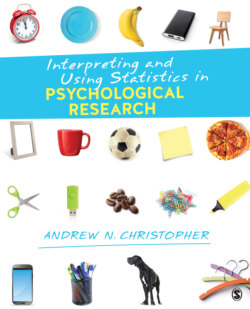Читать книгу Interpreting and Using Statistics in Psychological Research - Andrew N. Christopher - Страница 19
На сайте Литреса книга снята с продажи.
Learning Check
Оглавление1 In college, it sometimes seemed as though the harder I studied for a test, the worse I did on it. Explain how my thinking could be an example of an illusory correlation.A: If I study hard, I should do well on tests. If I don’t study hard, I should do poorly on tests. Those are normal states of affairs. What I recall, though, are the “weird” instances in which I studied hard but did poorly on a test. Because such instances are rare, they stand out and are easier to recall. Thus, I’ve made a false (illusory) connection between my study habits and test scores.
2 If a couple has had three children who were all girls, they might assume their fourth child is likely to be a boy. Explain why the couple might think their fourth child is likely to be a boy.A: There should be an “evening out” that occurs eventually (or so it feels to this couple). Of course, the sex of their fourth child has nothing to do with the sex of their first three children. This is an example of the gambler’s fallacy.
3 Explain why some people have a “lucky charm” that they like to carry with them wherever they go.A: People have established a connection in their mind between an object and desirable outcomes that resulted from that object. That’s how it became a “lucky charm” to them. For instance, some students have a “lucky pen” that they like to write with. For whatever reason, they have developed an illusory correlation that the pen is associated with good things, so they keep it with them. Likewise, some people may have a “lucky coin” that they keep in their possession at all times, figuring it will bring them good luck (or at least avoid bad luck). Indeed, illusory correlations are pervasive!
